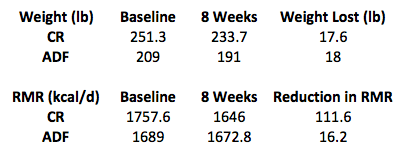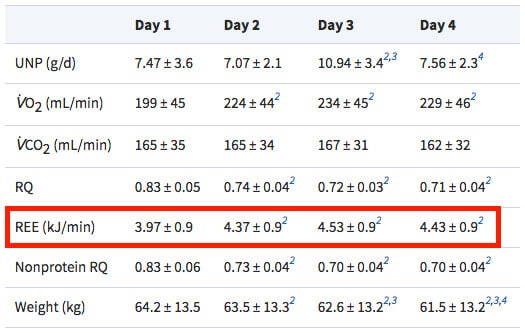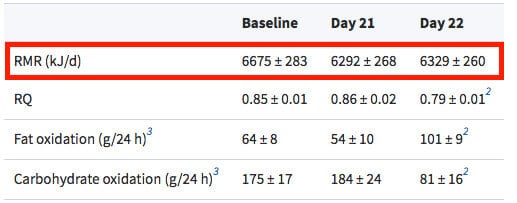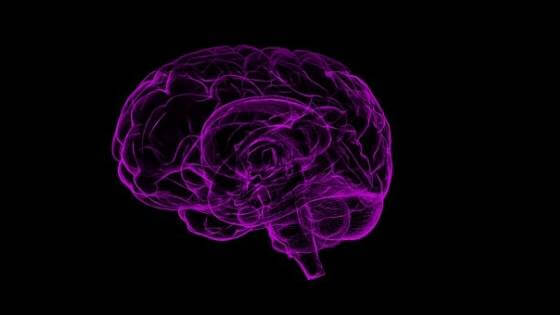The term metabolic damage is often used to describe the body’s response to a calorie deficit. The response is a decrease in metabolic rate that makes further weight loss difficult.
This idea, however, is best described by the term metabolic adaptations.
Metabolic adaptations are your body’s natural response to a decrease in calorie intake.
The response will be to reduce calorie expenditure to maintain energy balance and prevent starvation. (1, 2, 3, 4)
If your body were to stay in a caloric deficit forever, it would eventually run out of fat to burn and die.
For instance, if you eat 30% fewer calories, your body will eventually burn 30% fewer calories to match your intake.
Explore More: Metabolic Adaptations to Weight Loss
These adaptations make it challenging to lose weight and promote weight regain. They could also help explain why 80-90% of people tend to regain weight after the diet is over. (5)
There’s no debate that calorie restriction (CR) results in a lower basal metabolic rate (BMR) – the number of calories your body burns to maintain vital functions, such as breathing, circulation, and cell production.
People often believe the same happens when doing alternate day fasting (ADF) – a type of intermittent fasting (IF) that consists of fasting every other day – but even worse because you’re eating zero calories.
That’s not really the case.
Since you need calories to merely stay alive, your body doesn’t just reduce your BMR to zero. Instead, it switches from glucose to fat as a fuel source.
I cover that process in the article Stages of Fasting – What Happens When You Fast?
Lose your first 5-10 pounds in just 1 week.
Get the FREE 7-Day Keto Challenge!

Calorie Restriction vs. Intermittent Fasting
One difference between CR and IF is that CR doesn’t give access to your fat stores, your body thinks it doesn’t have enough energy and lowers your BMR.
On the other hand, fasting causes a decrease in insulin and an increase in norepinephrine that tells your body to give access to your fat stores. The body then realizes it has enough energy and attenuates the decrease in BMR (why would I lower energy expenditure when I have all this energy [fat] that I can use?).
Insulin
When you eat, your insulin levels typically go up. An increase in insulin tells your body to store fat instead of to burn it (insulin inhibits lipolysis).
If you’re always eating and keeping your insulin levels high, your body never gets the signal to switch from glucose to fat as fuel.
For instance, if you’re only eating 1000 cal/d, but your insulin levels are high, you have no access to your fat stores. Since all you have coming in is 1000 cal, all you can burn is 1000 cal, therefore, your body has no choice but to lower your BMR.
note: carbohydrates stimulate insulin more than proteins and fats. People on low carb diets can also get some of the benefits of fasting.
Explore More: Intermittent Fasting Benefits and Side Effects
Norepinephrine
Introduced later in the article.
Fasting Studies
1. Alternate Day Fasting (ADF) vs. Calorie Restriction (CR) for 8 Weeks
During this study, they split a group of obese adults into an ADF group and a CR group.

Source: Catenacci VA et al., Obesity (2016) 24, 1874-1883.
The ADF group was eating 0 calories during fasting days, while the CR group was on a daily 400 calorie deficit.
At the end of 8 weeks, both groups had lost around the same amount of weight; however, RMR decreased more in the CR group (111.6 cal/d) than it did in the ADF group (16.2 cal/d).
2. Short-Term Fasting
A few studies show a temporary increase in metabolic rate after short-term fasting.

Source: Zauner et al., “Resting Energy Expenditure in Short-Term Starvation is Increased as a Result of an Increase in Serum Norepinephrine.”
This study gathered 11 lean, healthy subjects and had them undergo 4 days of fasting.
Increase in Resting Energy Expenditure and Fat Oxidation
The study shows a 12% increase in resting energy expenditure (REE) and 370% in fatty acids in the bloodstream. It’s thought that the increase in REE could be due to the increase in norepinephrine caused by the decrease in glucose.
Norepinephrine (noradrenaline)
Norepinephrine is a hormone that’s released during times of stress and increases alertness and attention. (6)
It also promotes the breakdown of fats into fatty acids that can be used as energy by muscles and tissues.
Since norepinephrine stimulates glucose production (7) and this process requires energy, it’s thought that it may contribute to the increase in REE.
Other factors that could contribute to the increase in REE are the increased triglyceride-fatty acid cycling, which accounts for 1-2% of your BMR during the first few days of fasting, and the production of ketone bodies. (8)
3. 22 Days of Alternate Day Fasting.
The following study shows a minimal decrease in BMR after 22 days of alternate day fasting.

Source: Leonie K Heilbronn, “Alternate-day fasting in nonobese subjects: effects on body weight, body composition, and energy metabolism.”
Here, 16 nonobese subjects fasted every other day for 22 days. They lost 2.5% and 4% of their initial body weight and fat mass, respectively, with a minimal decrease in REE. (9)
For instance, a 200 lb subject could have lost 5 lb of body weight.
To Summarize
Short-term fasting may cause a temporary increase in BMR due to hormonal alterations and changes in fuel source.
These changes in hormones and fuel source might help explain why BMR doesn’t decrease as rapidly during alternate day fasting as it does during calorie restriction.
During CR you don’t have access to your fat stores, your body thinks it doesn’t have enough energy and lowers your BMR.
Alternate day fasting, however, causes a decrease in insulin and an increase in norepinephrine that tells your body to give access to your fat stores. The body then realizes it has enough energy and attenuates the decrease in BMR.
If you loved this article about whether or not intermittent fasting will damage your metabolism and are ready to start your weight loss journey, the Custom Keto Diet plan is the place to start!

This plan helps men and women lose fat without starving themselves or giving up their favorite foods.





